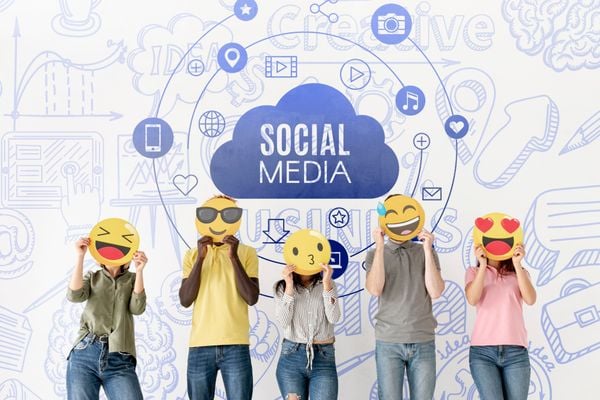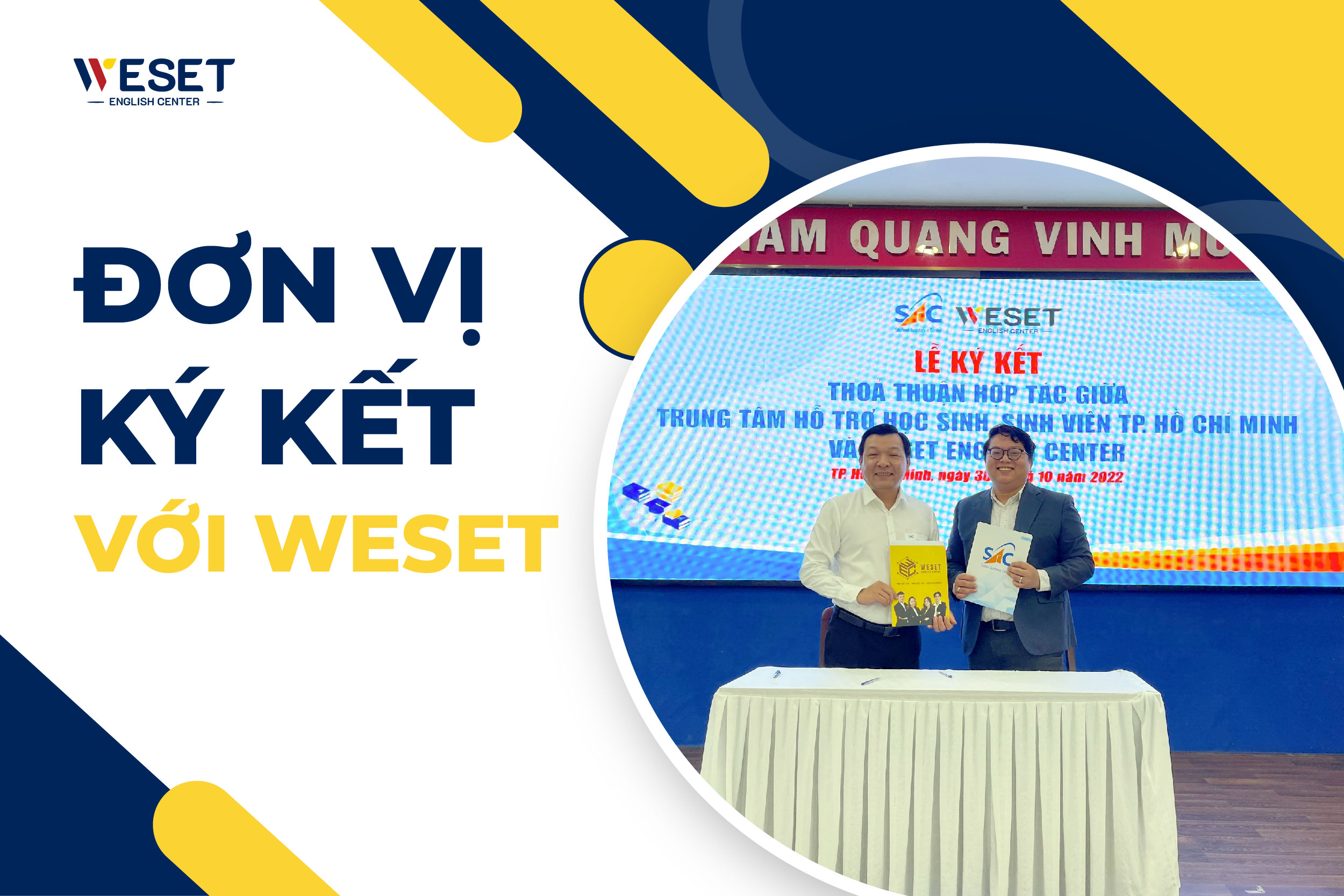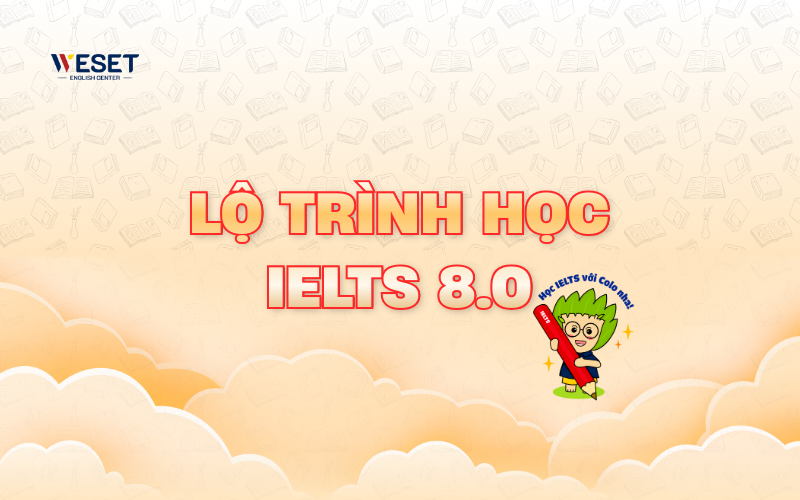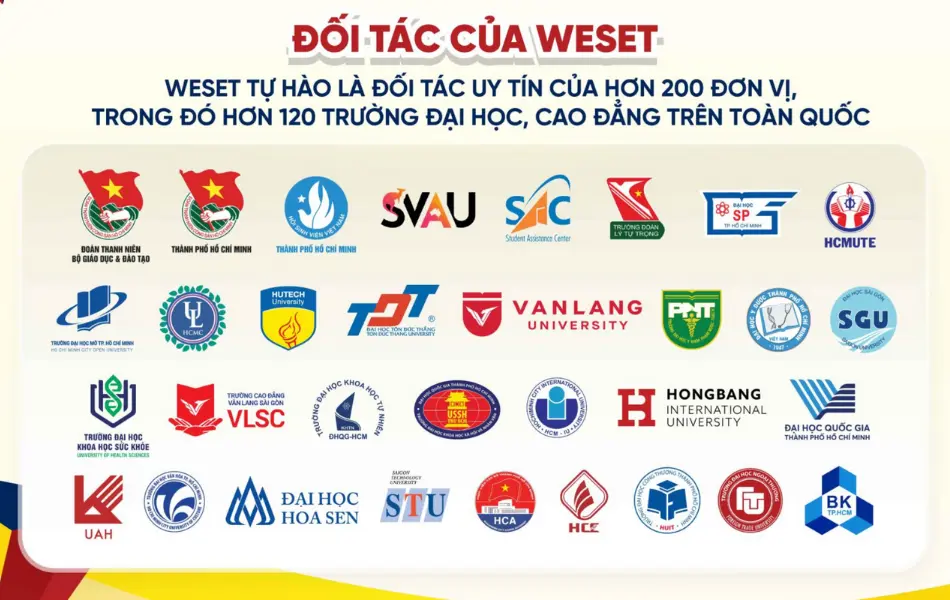Trang chủ Blog Bài thi IELTS mẫu Social Media IELTS Writing: Hướng dẫn & Bài mẫu
Social Media IELTS Writing: Hướng dẫn & Bài mẫu
- Jonathan M. Pham
- Bài mẫu IELTS Sample Writing, Bài mẫu Task 2 IELTS Writing sample, Bài thi IELTS mẫu
MỤC LỤC
Cùng WESET khám phá cách làm bài topic Social Media IELTS Writing – chủ đề rất thời thượng với thế hệ trẻ ngày nay bạn nhé!
Phân tích topic Social Media IELTS Writing
Sơ lược một số subtopic thông dụng với chủ đề Social Media trong IELTS Writing.
Impact on Society (Ảnh hưởng đến xã hội):
- How has social media transformed the way people communicate?
- Discuss the positive and negative effects of social media on society.
- Has social media increased or decreased social isolation?ư
Privacy and Security (Quyền riêng tư và bảo mật):
- Analyze the concerns regarding personal privacy and data security on social media platforms.
- How do social media companies handle user data, and what are the implications for users?
- Discuss the role of government regulations in protecting user privacy on social media.
Cyberbullying and Mental Health (Bắt nạt trên mạng và sức khỏe tâm thần):
- Explore the issue of cyberbullying on social media and its consequences.
- How does social media impact the mental health of users, especially younger individuals?
- What measures can be taken to address cyberbullying and promote a healthier online environment?
Fake News and Misinformation (Tin giả và thông tin sai lệch):
- Examine the spread of fake news and misinformation through social media.
- How can individuals and platforms combat the dissemination of false information?
- Discuss the role of fact-checking and media literacy in countering misinformation.
Social Media and Politics (Truyền thông xã hội và chính trị):
- Analyze the influence of social media on political discourse and elections.
- Discuss the role of social media platforms in shaping public opinion.
- Explore the challenges of regulating political content on social media.
Business and Marketing:
- Explain how businesses use social media for marketing and customer engagement.
- Discuss the advantages and disadvantages of social media advertising.
- Explore the impact of influencer marketing on consumer behavior.
Addiction and Screen Time (Chứng nghiện dùng Internet):
- Examine the addictive nature of social media and its impact on people’s daily lives.
- Discuss strategies for managing screen time and reducing social media addiction.
- How can parents and educators help children develop healthy digital habits?
Global Connectivity (Kết nối toàn cầu):
- Analyze how social media has connected people from different parts of the world.
- Discuss the role of social media in promoting cultural exchange and global awareness.
- Explore the challenges of dealing with language barriers and cultural misunderstandings online.
Future Trends (Xu hướng tương lai):
- Speculate on the future of social media and how it might evolve.
- Discuss emerging technologies and their potential impact on social media platforms.
- Consider the social, economic, and cultural implications of future developments in social media.
Đề bài mẫu topic Social Media IELTS Writing
Đề bài: The use of social media, e.g Facebook and Twitter, is replacing face-to-face contact for many people to their everyday life. Do the advantages of this development outweigh the disadvantages?
Give reasons for your answer and include any relevant examples from your own knowledge or experience. Write at least 250 words.
(Việc sử dụng các loại mạng xã hội như Facebook và Twitter đang dần thay thế những tương tác trực tiếp trong cuộc sống của rất nhiều người. Sự thay đổi này có mang lại nhiều lợi ích hơn là tác hại hay không?
Hãy đưa ra câu trả lời kèm theo những ví dụ từ kiến thức cũng như trải nghiệm của riêng bạn. Bài viết chứa ít nhất 250 từ.)
Phân tích đề bài:
- Topic: Social Media
- Subtopic: Impact on Society
- Dạng bài: Advantage and Disadvantage
Bài mẫu Social Media IELTS Writing – Sample answer
With the rise of social media platforms such as Facebook or Twitter, there is concern that virtual communication is becoming the new norm, taking over from vis-à-vis conversations. While there are certain drawbacks to this development, its overall impact of daily communication is positive: technology allows us the convenience of communication across distance as well as the discovery of new friendships, heavily outweighing baseless concerns about the loss of speaking skills.
Geographical and temporal differences no longer pose a challenge to communication in the face of social media. Whereas face-to-face communication requires the physical presence of all parties, online, friendships are facilitated by technology: as long as the internet is available, communication can take place unobstructed. With Facebook, for example, a group of four people at four different continents could call and speak to each other at the same time.
Social media platforms also cement a base on which new friendships can flourish. Algorithms exist on every site to gather users’ information, from which suggestions of like-minded communities can be made. With Facebook, for example, different communities exist under subsets of groups or pages, uniting people of similar interests, where they can communicate through messages, posts and comments, opinion polls, or reactions. This provides ease and convenience for new conversations to flourish and to turn into lasting friendships.
However, the development of social media has brought with it a fear: the loss of communicative skills. Yet, this concern is inherently baseless in that it fails to grasp the true role of social media platforms as mediators of verbal communication, rather than replacements. With almost every social media site, voice recordings as well as audio and video calls are available, and these alternatives to simple text messages play integral roles in every online conversation. Henceforth, the fear that verbal skills could be lost to the rapid growth of social media sites is unreasonable, as every accommodation possible has been made to allow for speech.
To reiterate, social media platforms have an overall positive effect on human communication. Sites such as Facebook or Twitter act as mediators of communication regardless of physical location and breeding grounds for new friendships. While it is certain that verbal conversations in real life and through an online platform are innately dissimilar, to say that speaking skills would be lost to the rise of social media sites is a baseless assumption.
Word count: 394 words
Từ vựng Social Media IELTS Writing Vocabulary
- Norm (n.) = điều thường lệ, quy tắc
- Baseless (adj.) = vô căn cứ
- To pose a challenge to (v.) = là một thách thức với
- To facilitate (v.) = tạo điều kiện cho
- Algorithm (n.) = thuật toán
- To flourish (v.) = phát triển
- Inherently (adv.) = một cách vốn dĩ
- Mediator (n.) = người trung gian
- Integral (adj.) = không thể thiếu
- Dissimilar (adj.) = không giống nhau
Đề bài mẫu Social Media IELTS Writing khác
Sample 1
Subtopic: Positive and Negative Impacts of Social Media on Society
Question Type: Opinion Essay
Question:
“Some people argue that social media has had a positive impact on society, while others believe that its influence has been mostly negative. To what extent do you agree or disagree with this statement? Support your opinion with examples and evidence.”
Sample Answer:
In recent years, the rise of social media has transformed the way people communicate, share information, and connect with others. The impact of social media on society is a subject of ongoing debate, with some arguing that it has brought about positive changes, while others contend that its influence has been largely negative. In this essay, I will argue that the impact of social media on society is a mixed one, with both positive and negative aspects to consider.
On the positive side, social media has undeniably expanded the possibilities for communication and connection. It has allowed people to stay in touch with friends and family across long distances, fostering a sense of community in a digital age. For example, I have friends living in different countries, and without social media platforms like Facebook or WhatsApp, maintaining our relationships would be much more challenging. Furthermore, social media has become a powerful tool for raising awareness about social and political issues. Movements like the Arab Spring and the #BlackLivesMatter movement gained momentum through social media, allowing people to organize and advocate for change.
However, it is essential to acknowledge the negative aspects of social media as well. One of the most significant concerns is the proliferation of fake news and misinformation. The rapid spread of false information on platforms like Twitter and Facebook can have serious consequences, including misinformed public opinions and even threats to democracy. Additionally, social media has been linked to increased rates of cyberbullying, which can have severe psychological effects on young people. The addictive nature of social media, with its constant notifications and scrolling, has also raised concerns about its impact on mental health and productivity.
In conclusion, the influence of social media on society is a complex issue with both positive and negative dimensions. While it has undoubtedly facilitated communication and activism, it has also given rise to significant challenges such as misinformation and cyberbullying. Therefore, I agree with the statement that the impact of social media is a mixed one, and its effects on society depend on how it is used and regulated. To harness its benefits while mitigating its drawbacks, society must continue to examine and adapt to the evolving role of social media in our lives.
Sample 2
Subtopic: Cyberbullying and Mental Health
Question Type: Problem and Solution Essay
Question:
“Cyberbullying has become a prevalent issue on social media platforms, leading to adverse effects on the mental health of young users. What are the causes and consequences of cyberbullying on social media, and what measures can be taken to address and prevent it?”
Sample Answer:
In recent years, the advent of social media platforms has brought people together in unprecedented ways, but it has also given rise to an alarming issue: cyberbullying. This form of harassment and intimidation on digital platforms has detrimental effects on the mental health of young users. In this essay, I will discuss the causes and consequences of cyberbullying on social media and propose measures to address and prevent it.
The causes of cyberbullying on social media are multifaceted. Firstly, the anonymity that the internet provides often emboldens individuals to engage in hurtful behavior they would not do in person. Secondly, social media platforms make it easy for bullies to target their victims continuously and publicly, which can exacerbate the harm inflicted. Finally, the proliferation of social media has amplified the scope of bullying, making it possible for harassers to reach a vast audience swiftly.
The consequences of cyberbullying are severe, particularly on the mental health of young people. Victims of cyberbullying often suffer from anxiety, depression, and feelings of isolation. In extreme cases, it can lead to self-harm or even suicide. Furthermore, the fear of cyberbullying can prevent individuals from expressing themselves freely online, stifling their ability to engage in healthy online discussions and social interactions.
To address and prevent cyberbullying, several measures can be taken. Social media platforms should enhance their content moderation policies and swiftly remove offensive content and users who engage in cyberbullying. Education programs in schools should teach students about the consequences of cyberbullying and how to report and support victims. Parents and guardians should actively monitor their children’s online activities and maintain open lines of communication to ensure their safety. Additionally, individuals should be encouraged to use social media responsibly and kindly, promoting a culture of empathy and respect.
In conclusion, cyberbullying on social media is a pressing issue with far-reaching consequences, particularly for the mental health of young users. By understanding its causes and effects and implementing measures to combat it, society can create a safer and more welcoming online environment for everyone.
Sample 3
Subtopic: Privacy and Security
Question Type: Advantage and Disadvantage Essay
Question:
“Social media platforms often collect and share users’ personal data for various purposes. What are the advantages and disadvantages of this practice, and how can individuals protect their privacy in the age of social media?”
Sample Answer:
In the digital age, social media platforms have become integral parts of people’s lives, enabling them to connect, share, and communicate globally. However, the widespread collection and sharing of users’ personal data by these platforms have raised significant concerns. In this essay, I will discuss the advantages and disadvantages of this practice and propose ways for individuals to safeguard their privacy in the era of social media.
The advantages of social media platforms collecting and sharing personal data are evident. It allows for highly targeted advertising, which can be beneficial to both businesses and users. Users are more likely to see ads that align with their interests and preferences, enhancing their online experience. Moreover, the collection of data can lead to the development of better services and features on these platforms, tailoring content and recommendations to individual users.
However, this practice also comes with notable disadvantages. One of the primary concerns is the potential for data breaches and misuse. When personal data falls into the wrong hands, it can lead to identity theft, financial fraud, or other forms of cybercrime. Additionally, the extensive tracking of users’ online behavior raises questions about personal privacy and consent. Many users are unaware of the extent to which their data is collected and shared, and this lack of transparency can erode trust in social media platforms.
To protect their privacy in the age of social media, individuals can take several measures. First and foremost, they should review and adjust their privacy settings on social media platforms to limit the amount of personal information shared. Regularly updating passwords and enabling two-factor authentication can enhance account security. It is also advisable to be cautious about sharing sensitive information online and to use strong, unique passwords for different accounts.
In conclusion, the collection and sharing of personal data by social media platforms have both advantages and disadvantages. While it can enhance user experiences and enable targeted advertising, it also poses risks to privacy and security. To protect their personal information, individuals should be proactive in managing their online presence and taking steps to secure their accounts.
Lời kết
Hy vọng bạn đọc đã có những phút giây nghiên cứu và học tập bổ ích với những chia sẻ trên đây về topic Social Media IELTS Writing. Chìa khóa để thành thục và đạt điểm cao trong Writing chính là luyện tập thường xuyên – với nhiều dạng chủ đề Writing khác nhau. Trong trường hợp có quan tâm, hãy dành thời gian xem qua thư viện bài mẫu của WESET – đồng thời đăng ký nhận tin và tìm hiểu các khóa học IELTS theo lộ trình của WESET để có hướng đi phù hợp cho chính mình bạn nhé!
Bài mẫu Sample Writing theo chủ đề khác:







